A 30-YEAR ENDOMETRIOSIS JOURNEY
My name is Morẹ́nikẹ́, which means 'I have found one to cherish' in Yorùbá. This comic chronicles my 30-year battle with endometriosis, titled 'A Journey of Cherished Strength: 30 Years of Living with Chronic Illness'. Feel free to use the menu links at the bottom of the page to skip to areas of interest or simply scroll to read everything in detail!
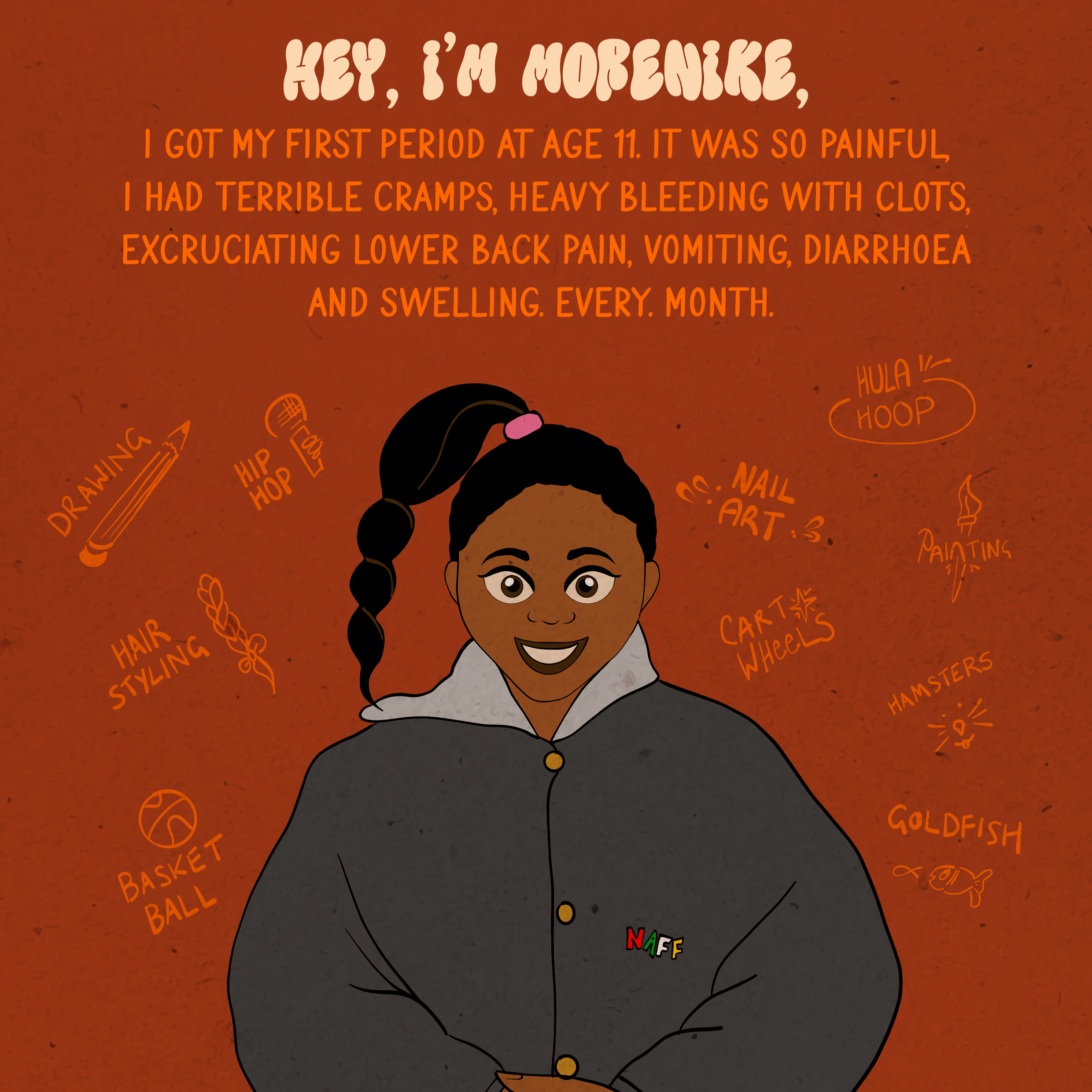
EARLY SIGNS OF ENDOMETRIOSIS
For an entire year leading up to my very first period, I had excruciating lower back pain that left me struggling to stand. Despite my mum seeking help from my GP, I received no assistance from him. Little did I know, this relentless pain was tied to my menstrual cycle, serving as the initial indication of a deeper issue.
At age 11, during the summer before starting high school, I experienced my first period. It commenced with intense lower back pain and crazy cramps accompanied by light, almost brown-coloured bleeding. The following month, while at school, my period escalated dramatically: heavy bleeding, bright red in colour, punctuated by clotting, severe pain, vomiting, and abdominal swelling.
This marked the abrupt end of my carefree childhood days—no more playing outside with my brother or riding my bike with friends. Instead, I found myself confined to my bed for two weeks out of every month. I vividly recall missing out on the hands-on experience of dissecting frogs in science class, relegated instead to the confines of my bed, writhing in pain and screaming the house down.
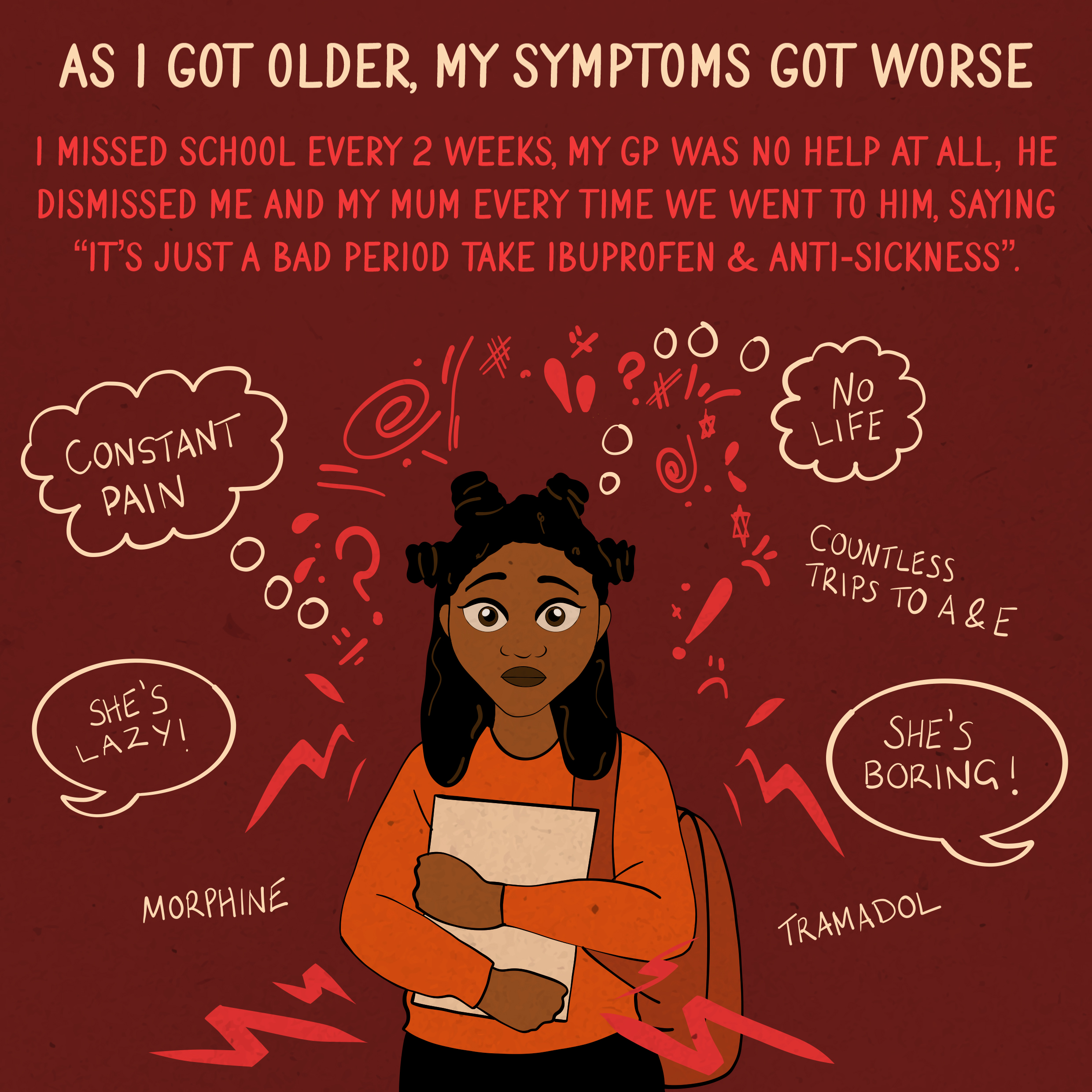
YEARS OF PAIN AND MISDIAGNOSIS
For years, I endured a relentless 21-day menstrual cycle, lasting 10 agonising days each time, with visits to the GP resulting in futile attempts at relief through a myriad of painkillers and anti-inflammatories, all while my symptoms—severe cramps, excruciating lower back pain, clotting, vomiting, diarrhea, abdominal swelling, leg pain, constipation, and fatigue—intensified.
I was offered birth control at age 13 and accused of being sexually active by a nosey nurse at my GP surgery who rudely commended my mum for putting me on contraceptives! My mum set her straight. To compound matters, weight gain added to my physical burden and my symptoms worsened, leading to a miserable school and college experience, marked by missed classes, dwindling friendships, and social isolation.
Frequent A&E visits yielded no diagnoses, leaving me with only morphine or tramadol for respite, while my health declined, and relationships faltered, leaving me with no semblance of a normal life.
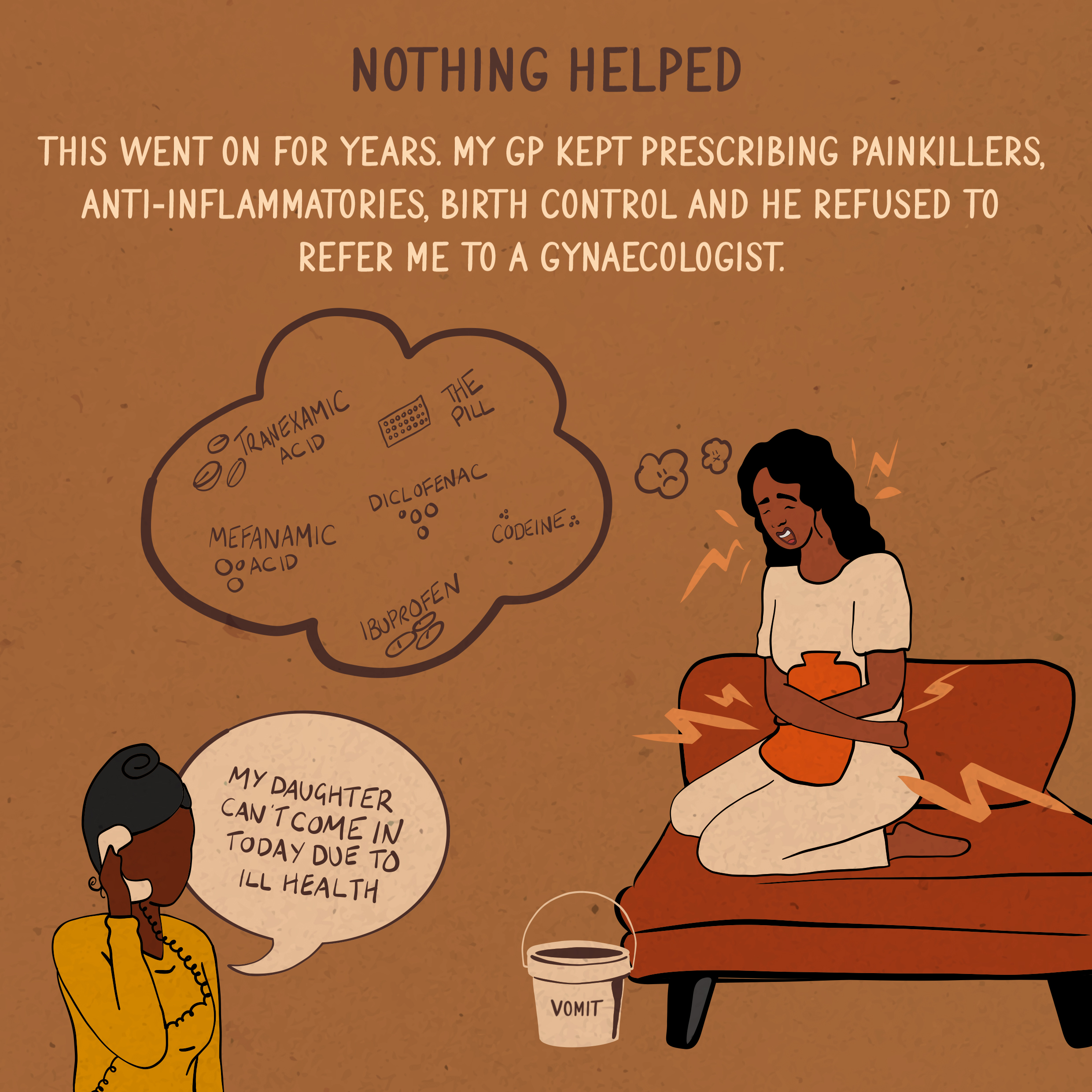
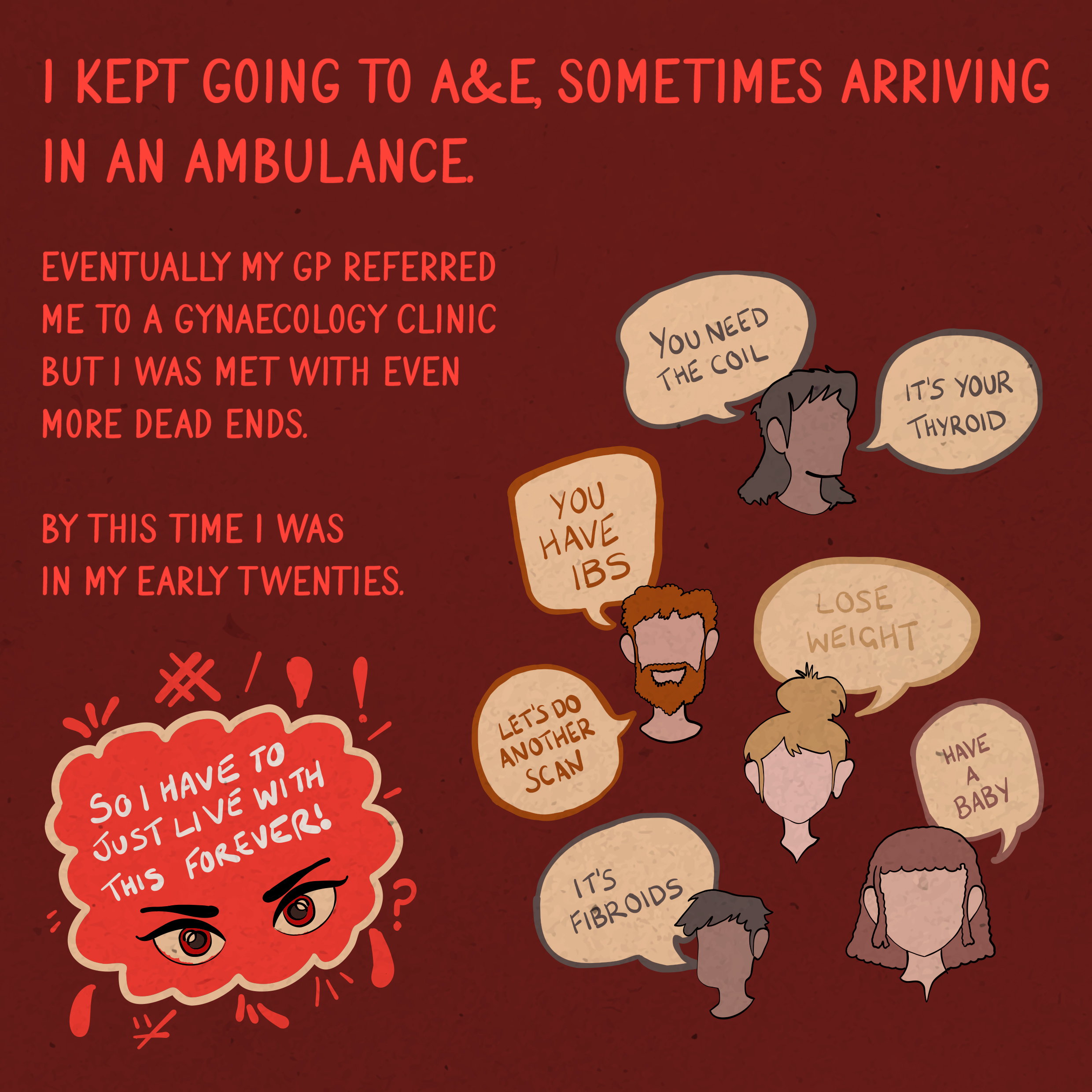
MEDICAL ROADBLOCKS
During my early twenties, while navigating university life, my struggle with endometriosis reached a breaking point. Despite numerous visits to the A&E and pleading with my GP, he refused to refer me to a gynaecology clinic for years before he finally referred me! At the clinic, frustration mounted as I encountered a revolving door of medical professionals, who dismissed my debilitating symptoms. Scans yielded no answers, and the proposed solutions ranged from inserting a coil to losing weight, diagnosing irritable bowel syndrome (IBS), considering pregnancy, and even exploring thyroid issues! Each suggestion fell short, leaving me feeling unheard and disheartened in my quest for proper diagnosis and treatment.
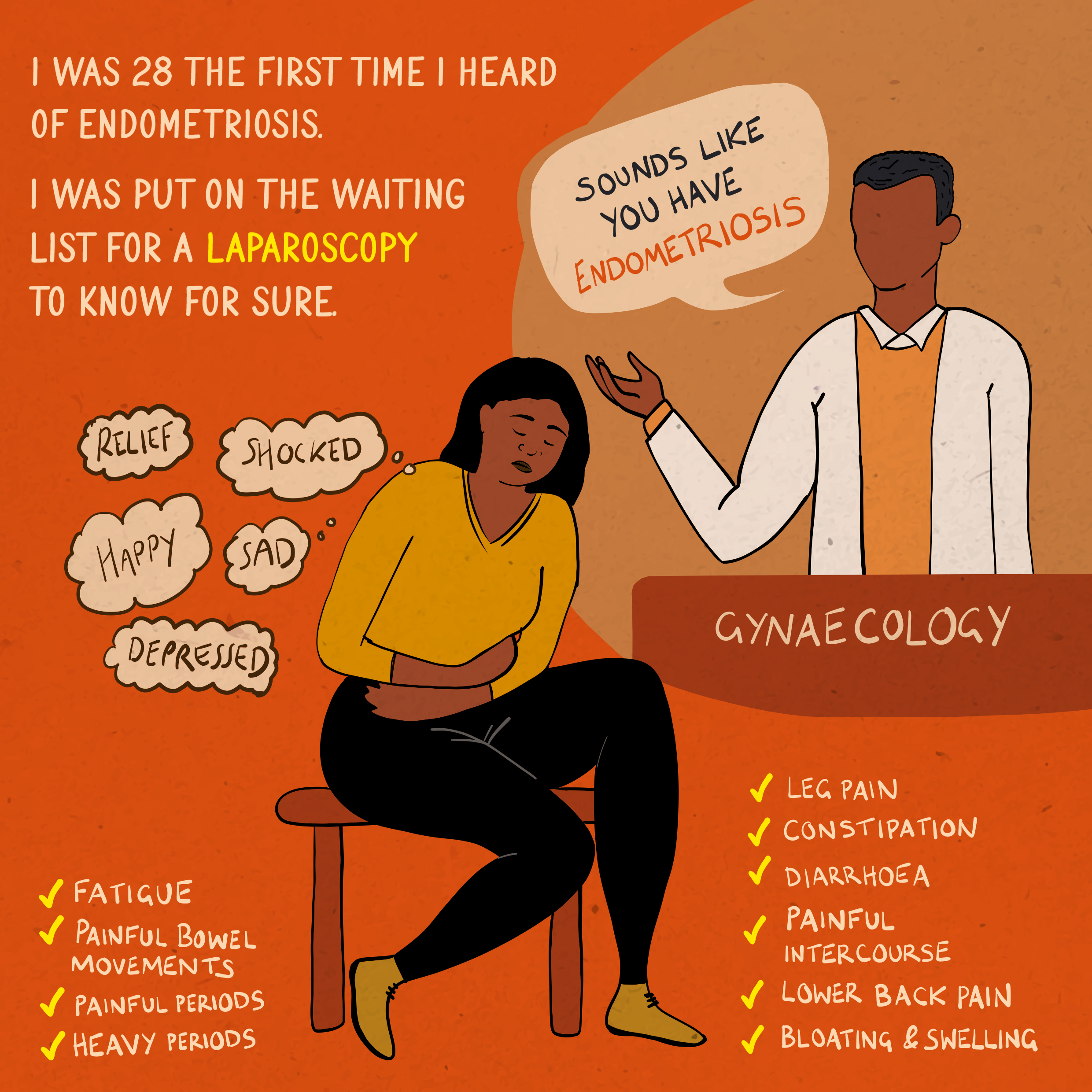
A TURNING POINT
At the age of 28, during yet another gynaecological appointment and facing yet another unfamiliar doctor, I recounted my enduring symptoms once more. After exhausting all conventional treatments and medications, this doctor, in a seemingly casual remark, uttered the words that would alter my understanding of my condition forever:
'Sounds like you have Endometriosis.' With a medical encyclopedia in hand, he reeled off the condition's characteristics, and as he spoke, every symptom resonated with me—I had all of them, without exception. In that moment, the name 'Endometriosis' became more than a medical term; it was a revelation, a beacon of recognition for the suffering I had endured for years.
Immediately placed on the waiting list for a laparoscopy, the only definitive means of diagnosis, I grappled with a whirlwind of emotions. Deep down, I had harboured a nagging suspicion that this was the answer, yet the confirmation plunged me into a profound sense of despair. Fears of infertility and the prospect of a perpetually dismal existence loomed large, casting a shadow over my hopes and dreams.
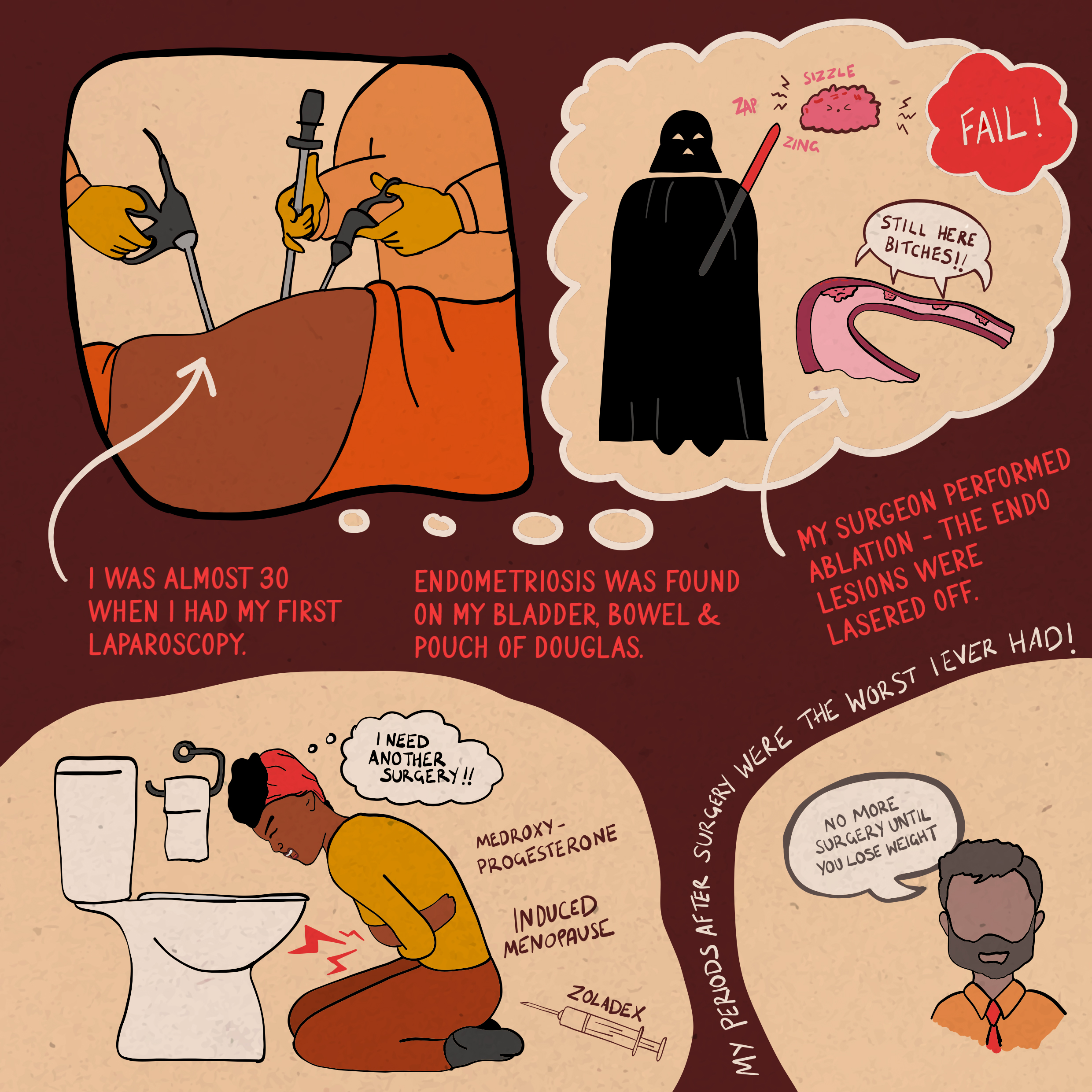
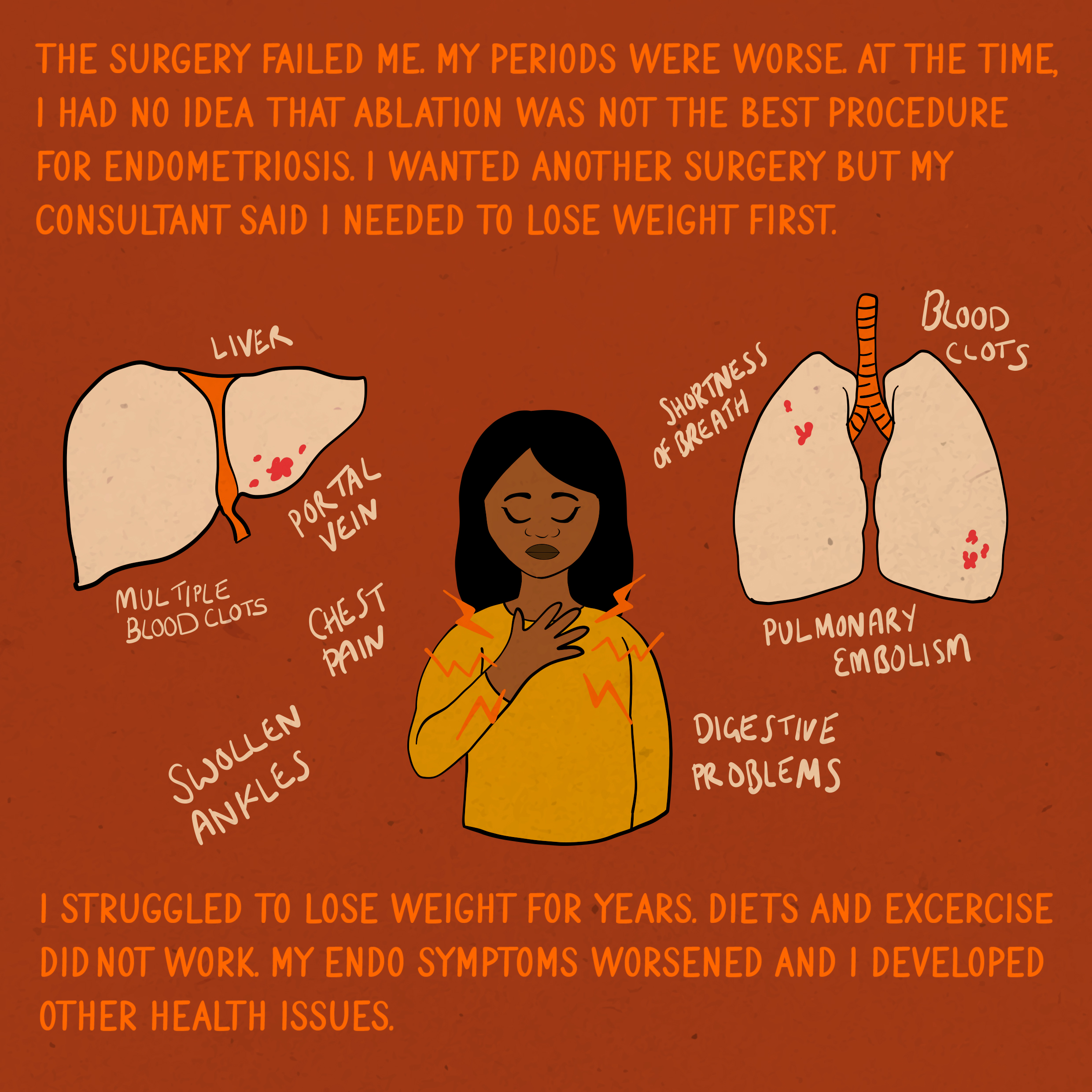
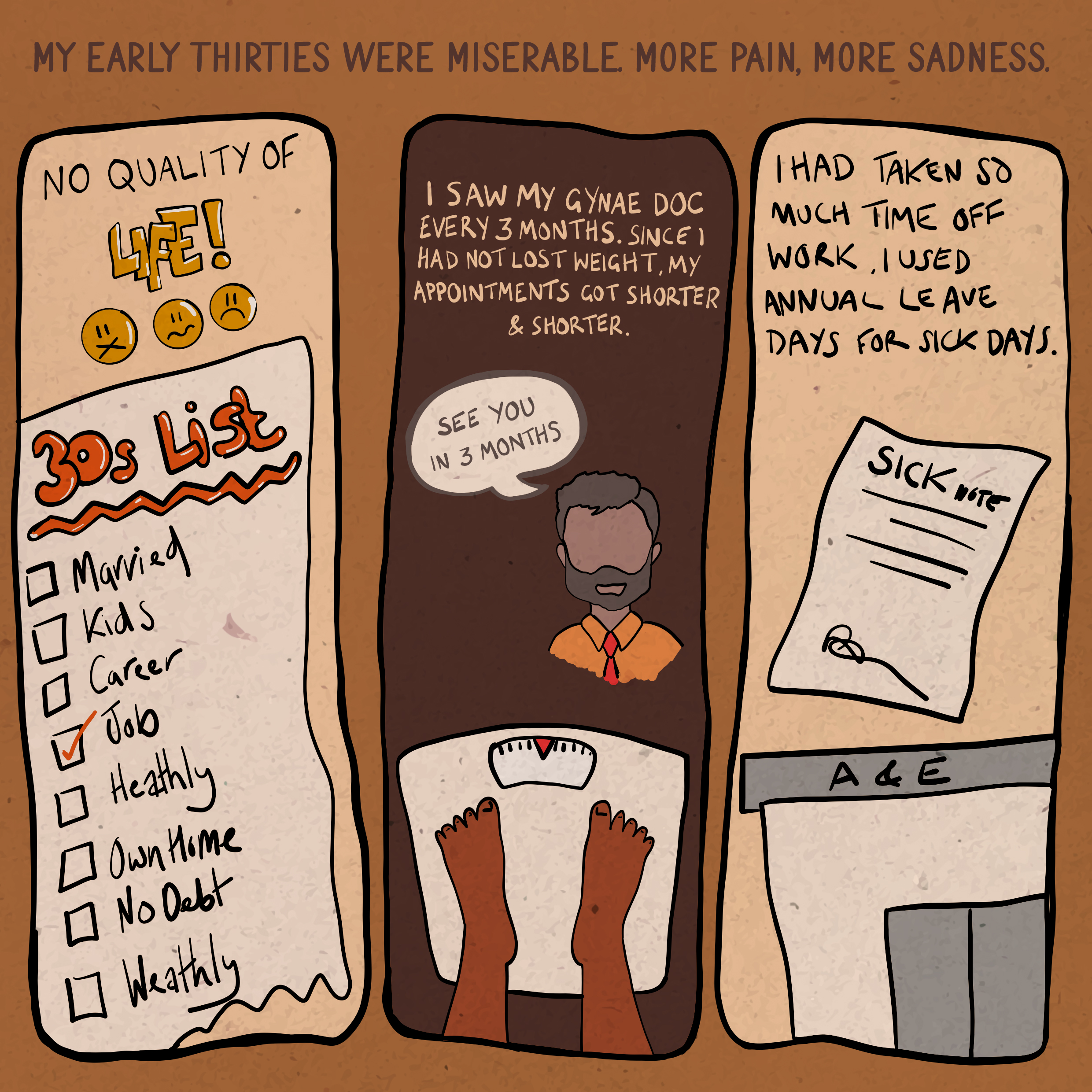
DISAPPOINTED
Approaching my 30th birthday, I underwent a laparoscopy with minimal guidance on what to expect or available treatment options. I was informed that any detected endometriosis would be treated through ablation, I remained unaware of alternative procedures. Despite consulting with my gynaecologist who specialised in endometriosis, infertility, and PCOS, another doctor performed my surgery. The procedure revealed endometriosis lesions on my bladder, bowel, and Pouch of Douglas, which were treated via ablation. Although discharged the same day and returning to work after two weeks, my post-surgery period was agonisingly worse.
This pattern persisted, rendering the surgery, in my view, unsuccessful. Subsequent treatment with Zoladex and medroxyprogesterone aimed to induce medical menopause and cease bleeding, yet failed to alleviate other symptoms. Dishearteningly, my surgeon denied a second surgery, citing weight as a barrier, despite my struggles with unsuccessful weight loss attempts through dieting and exercise.
As I look back, I can't help but wonder if the plethora of medications, including birth control and hormone tablets, had taken their toll on me, or if the endometriosis had progressed to affect more organs within my body. Facing multiple blood clots, I now rely on lifelong Warfarin therapy to prevent further complications. Reflecting on the stories of other women online, I strongly suspect the presence of endometriosis in my lungs (Thoracic endometriosis), yet my concerns are met with indifference when it comes to further investigation.
My thirties were marked by misery—a stark absence of quality of life, companionship, romantic relationships, children, and a fulfilling career. Despite regular appointments with my gynecologist every three months, these sessions grew shorter and less fruitful over time. The routine of being weighed, seeing no change, and leaving persisted, while I continued to grapple with ongoing health issues that necessitated time off work. By the age of 30, the cumulative toll of missed school, college, university, and work days had become too numerous to tally.
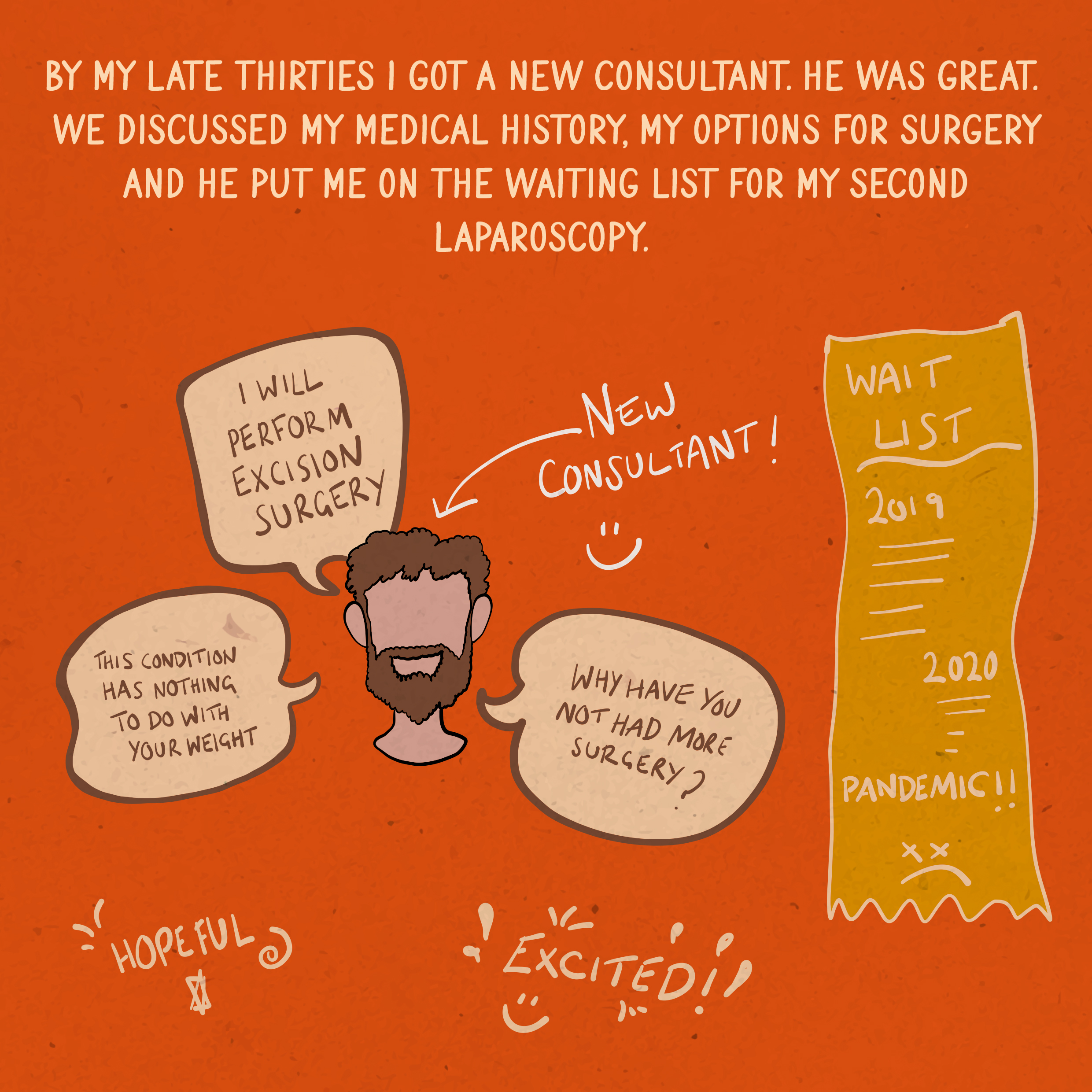
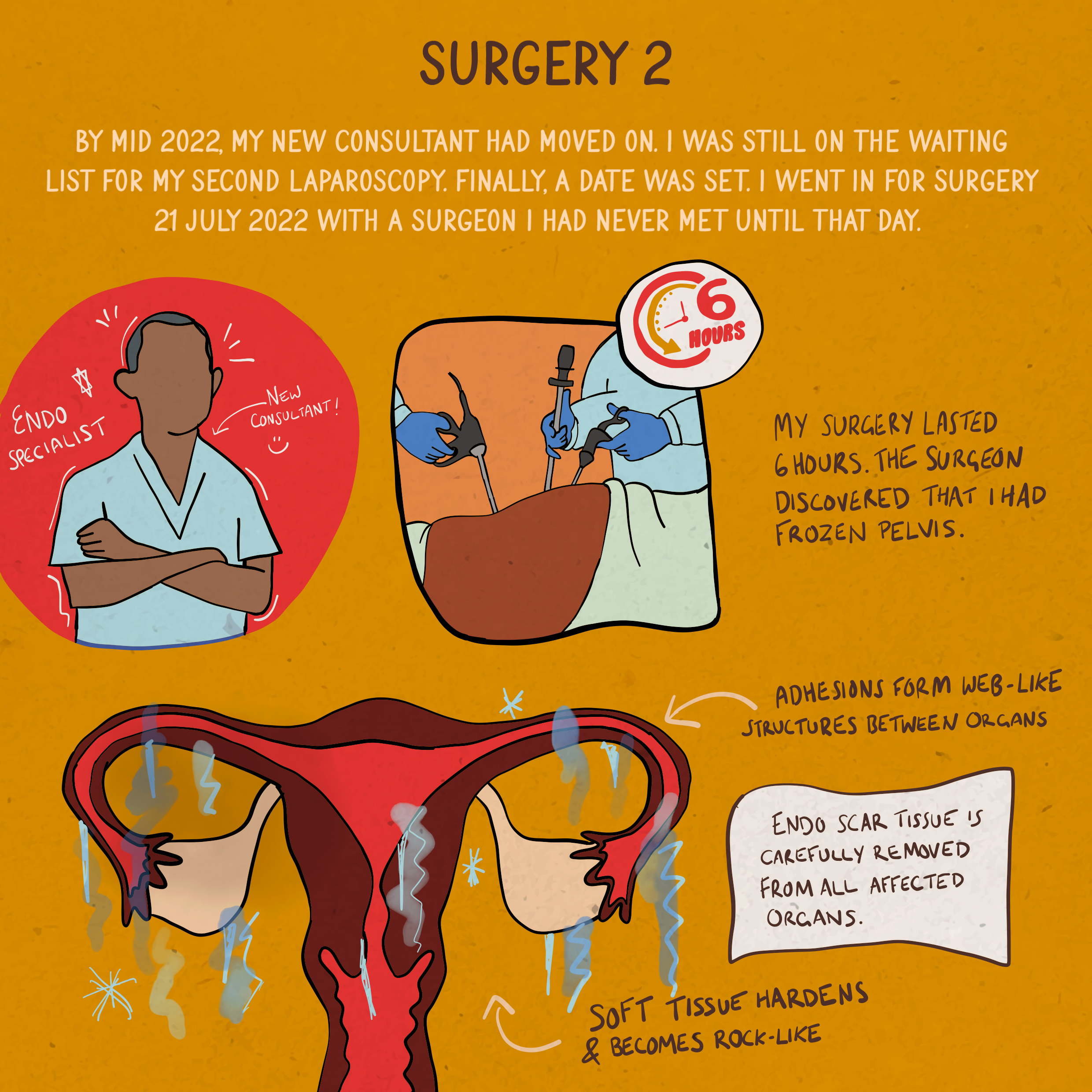
HOPE AMIDST UNCERTAINTY
In my late thirties, after my previous gynaecologist had moved on, I was assigned a new consultant who offered a glimmer of hope. Unlike my previous experience, he assured me that my weight wouldn't be a barrier to surgery, instilling a sense of confidence. This time, he promised an excision surgery—a method aimed at removing endometriosis at its roots. Filling out a Quality of Life Scale form, which documented my physical, psychological, and social well-being, brought me to tears as I confronted the harsh reality of my situation. Was this truly my life?
In 2019, I finally made it onto the waiting list for my long-awaited second laparoscopic surgery. However, the process was severely delayed due to the unprecedented challenges posed by the 2020 pandemic.
In July 2022, I received an email from the hospital, apologising for the delay in my surgery and confirming whether I still wished to remain on the waiting list. Despite the setbacks, I was resolute in my decision to proceed. However, my trusted consultant had moved on, and I learned he was gravely ill. Instead, I was scheduled for surgery on 21st July 2022, under the care of a surgeon unfamiliar to me. Preparation for the procedure involved several days of rigorous steps, including COVID-19 lateral flow tests, INR blood tests, bowel preparation, and adhering to a low-residue diet.
On the day of surgery, as my brother drove me to the hospital, apprehension engulfed me, and tears flowed freely. Fear gripped me as I grappled with the uncertainty of waking from the general anesthesia. Upon arriving at the hospital, my emotions overwhelmed me as my mum and sister accompanied me to the ward. With a heavy heart, I bid them farewell and donned the hospital gown and compression stockings, preparing for the procedure ahead.
Meeting my surgeon proved to be a turning point, instantly dispelling my anxieties with his reassuring demeanor and clear plan of action. Despite the unexpected duration—lasting six hours—my surgeon delivered a diagnosis of a 'frozen pelvis,' indicative of deeply infiltrating endometriosis that had extensively affected my pelvic organs, necessitating intricate surgical intervention. With the assurance that all endometriosis had been excised, my focus shifted to recovery.
Remarkably, post-surgery, I experienced a sense of normalcy, free from pain or discomfort, eagerly anticipating the celebration of my brother's birthday on the 24th.
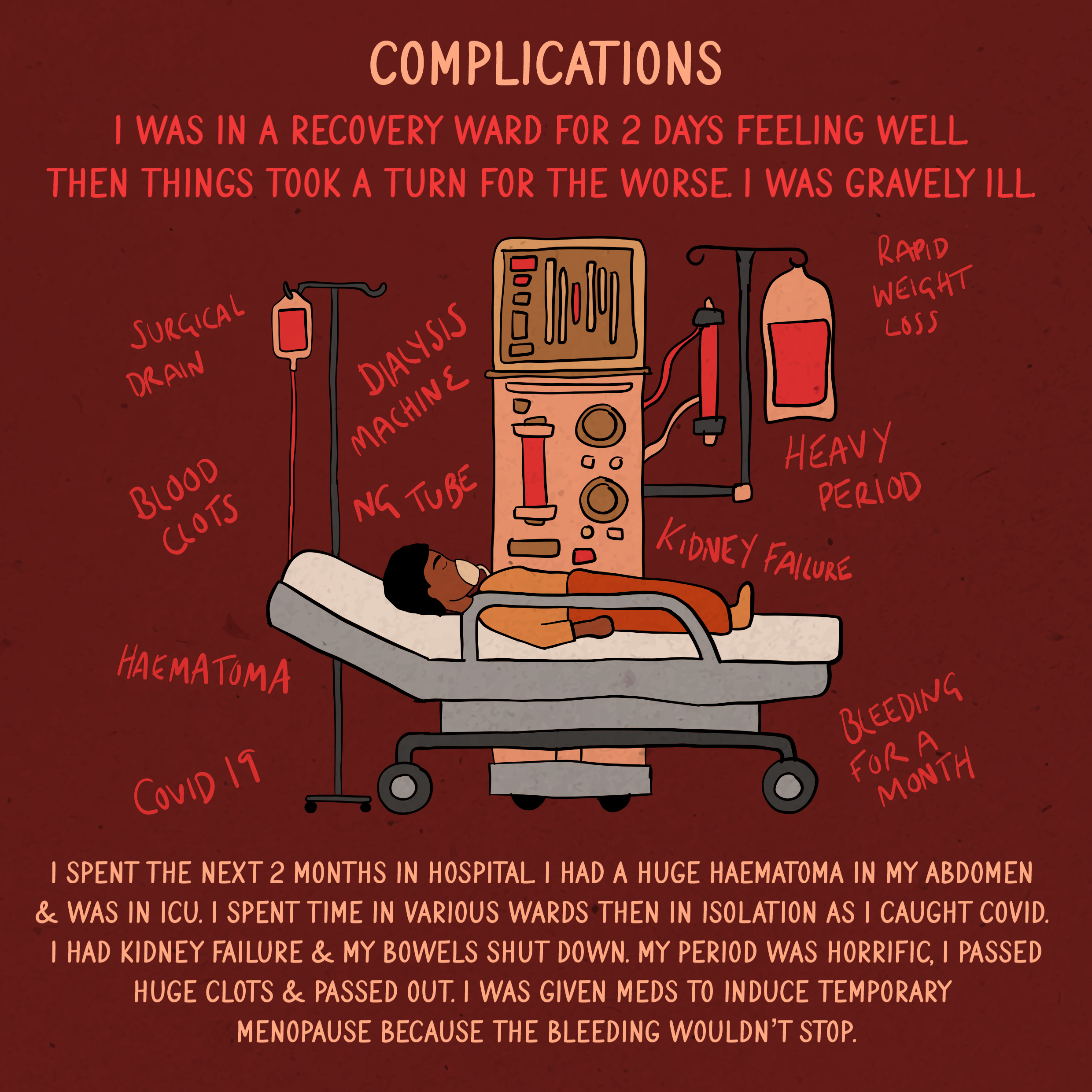
A CRITICAL TURN
After what initially seemed like a successful surgery, my recovery took a devastating turn. Just days post-operation, I found myself grappling with excruciating pain and overwhelming weakness, signaling that something was amiss. A mere week later, I underwent another surgery, this time to address a massive hematoma and multiple blood clots wreaking havoc in my abdomen. My condition deteriorated rapidly, leaving me in critical condition. It was only through the skillful intervention of my surgeon that my life was saved, a debt of gratitude I'll forever carry.
Emerging from a medically induced coma, I found myself tethered to an array of medical tubes and lines—NG tubes, surgical drains, central lines, arterial lines, all intricately connected to various parts of my body. What ensued was a harrowing two-month hospital stay, marked by multiple stints in intensive care, an isolated battle with COVID-19, and complications such as kidney failure necessitating dialysis. Amidst the medical chaos, I encountered both compassionate NHS staff—ranging from dedicated doctors to nurses and healthcare assistants—and a less-than-supportive environment among some fellow patients, exposing me to the grim realities of illness and mortality.
Stripped of my autonomy, I grappled with profound physical limitations—I couldn't wash myself, could barely manage personal hygiene tasks, and was entirely reliant on hospital staff, my mum, my brother and my two sisters for even the most basic movements. Isolated from my loved ones due to my COVID-19 diagnosis, I longed for the comfort of familial presence amidst the tumultuous journey of recovery.
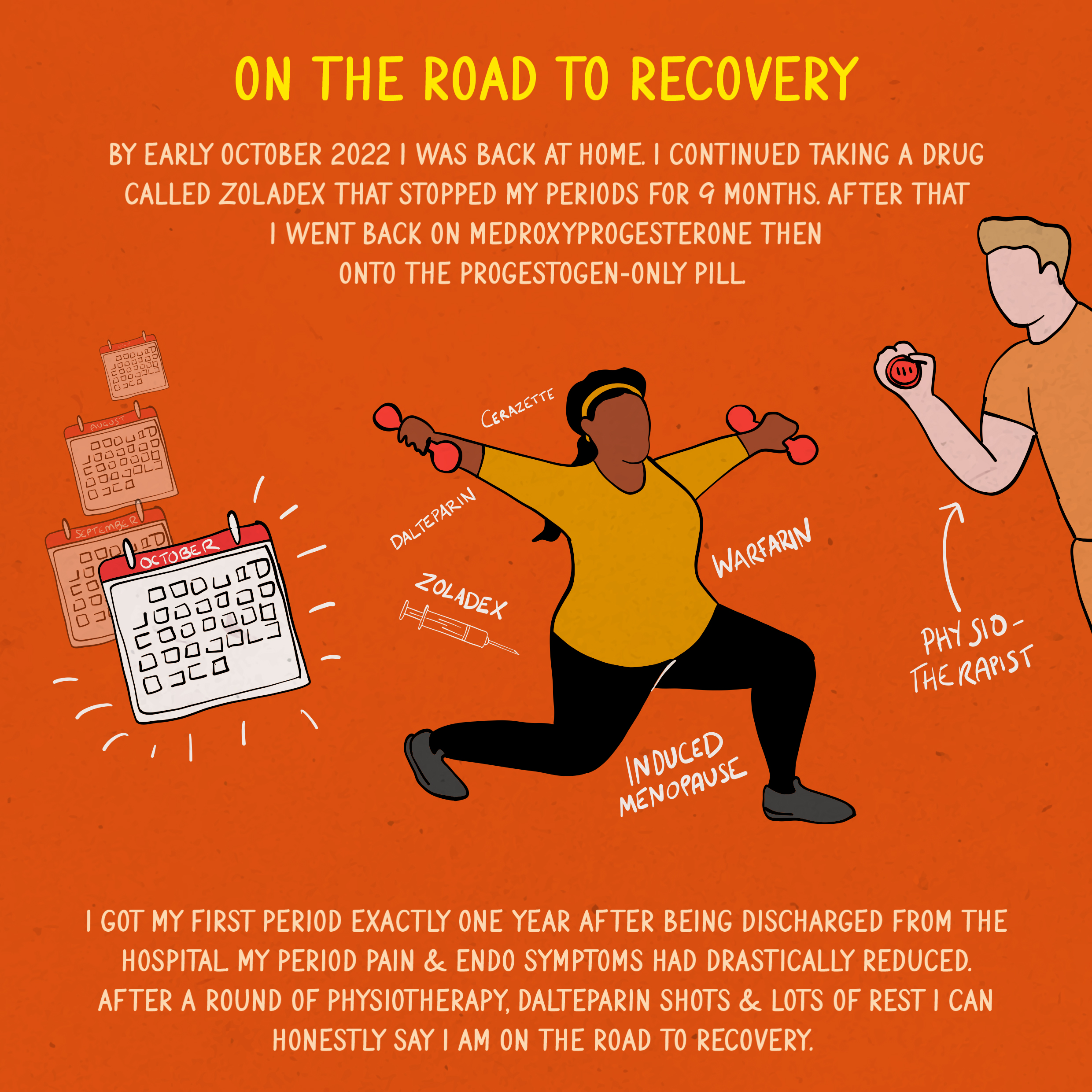
LIFE AFTER SURGERY
Following my discharge from the hospital, I settled back home by early October 2022. Resuming work, I juggled a demanding schedule of 2-3 hospital visits per week, alongside monthly appointments for Zoladex injections. Engaging in physiotherapy sessions aided my recovery process, complementing my continuous birth control regimen that effectively eliminated menstrual periods and contributed to a significant reduction in both pain and other endometriosis symptoms post-surgery. However, the journey was not without its setbacks.
In September 2023, I faced an unexpected challenge when my first period since surgery resulted in a visit to the A&E due to chest pains, low blood sugar, and shortness of breath, underscoring the ongoing complexities of managing my condition beyond the operating room. Throughout this journey, I found solace in the support of healthcare professionals, the embrace of therapy, and the resilience cultivated through navigating the highs and lows of recovery.
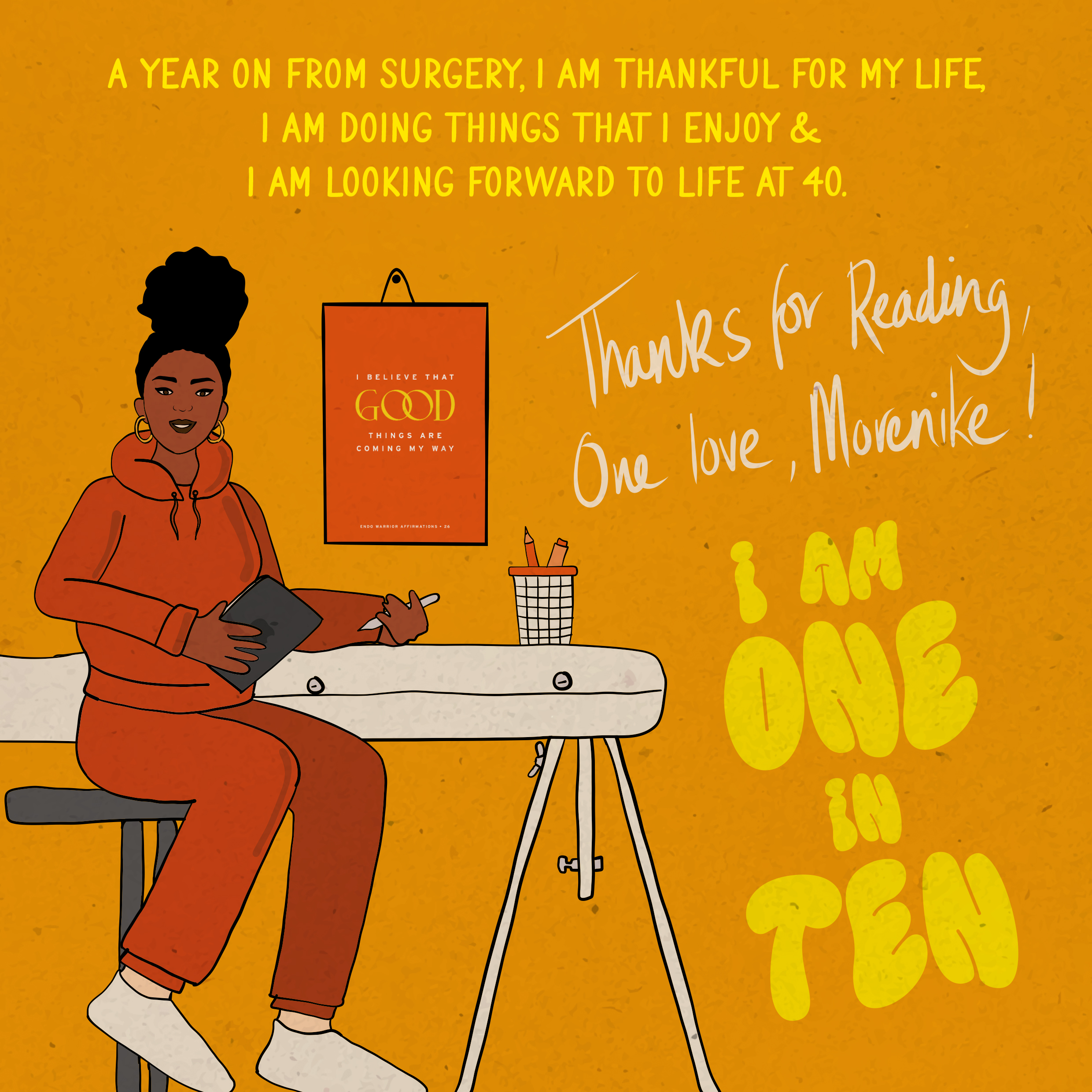
EMBRACING NEW BEGINNINGS
I completed this comic just a few months before my 40th birthday. It felt incredibly gratifying to finish something so creative, especially after having to set aside many of my hobbies due to the challenges of endometriosis. However, I must admit that I also felt overwhelmed at times, leaving my work untouched for long periods. Now, as I celebrate turning 40 on 15th March, 2024, I find myself reflecting on the tumultuous yet transformative journey I've travelled.
Now, approaching two years post-surgery, I stand at the threshold of a new chapter, feeling immensely better than before. While the battle against endometriosis is far from over, I approach the future with renewed hope and determination. As I embark on this next phase of my life, I eagerly embrace the opportunity to reclaim my health, my happiness, and my dreams. Here's to new beginnings and the promise of a brighter tomorrow!
Are yOu facing EndOmetri0sis?
Fancy a chat?
Email me at hi@morenike.design
Share this page to help spread awareness!